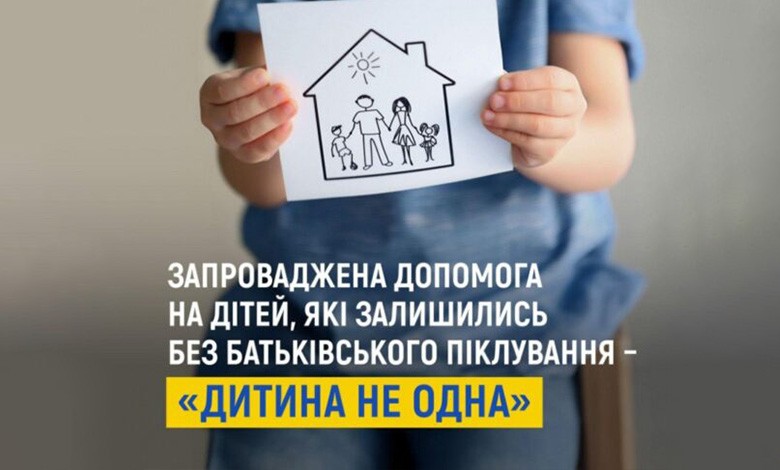‘A Child is Not Alone’ programme: new help for children without parental care

The Cabinet of Ministers has introduced a new initiative called ‘A Child is Not Alone’ aimed at supporting children temporarily left without parental care. This programme provides financial assistance to families who temporarily take care of children until they acquire the official status of an orphan or child deprived of parental care. The mechanism and design of the programme were developed by the Ministry of Social Policy of Ukraine.
Features of the ‘Child is not alone’ programme
Prior to the introduction of this programme, families who took in children for temporary care did not receive financial support. This often caused economic difficulties in such families, which in some cases led to the placement of children in institutional care. In particular, in cases where children were placed with low-income families, such as grandmothers or distant relatives, the lack of adequate financial support made it difficult to support the child.
With the launch of the new programme, the situation has changed significantly. The government has allocated funds to support such children, and at the time of publication, 483 children have received assistance, totalling UAH 14.565 million.
Amount of assistance
Financial assistance is determined depending on the child’s age and health status:
- For healthy children, the payment is 2.5 subsistence minimums per child of the corresponding age.
- For children with disabilities, the payment is increased to 3.5 subsistence minimums.
Taking into account the subsistence minimum for 2024, the payments look like this:
- For children under 6, the subsistence minimum is UAH 2,563. Thus, 2.5 subsistence minimums are UAH 6407.5, and 3.5 subsistence minimums are UAH 8970.5.
- For children aged 6 to 18, the subsistence minimum is UAH 3196. Accordingly, 2.5 subsistence minimums are equal to UAH 7,990, and 3.5 subsistence minimums are equal to UAH 11,186.
These amounts help to reduce the financial burden on families temporarily caring for children by providing them with the necessary support until the child’s legal status is resolved.
Who is eligible for assistance
According to the Resolution of the Cabinet of Ministers of Ukraine No. 331 of 22 March 2024, the assistance can be applied for by persons with whom the child is temporarily placed. These can be relatives, foster families or even family-type children’s homes. The main condition is the family’s permanent residence in Ukraine. Temporary placement of a child is approved by an order of the Service for Children.
The period of payment of the allowance may be extended if the temporary placement of the child is extended by the decision of the relevant service.
Conditions for the provision of assistance
You can apply for the allowance at the social protection authorities, administrative service centres (ASCs) or local executive bodies of territorial communities. The allowance is paid to the recipient’s personal account in a designated bank or through a post office at the place of residence.
The main grounds for the temporary placement of a child in a family and receipt of assistance include:
- Death or loss of life of one of the parents (if the other parent does not fulfil his or her duties).
- Temporary occupation or encirclement of the settlement where the parents live.
- Parents going missing or being recognised as such under special circumstances.
- One of the parents is in captivity or imprisoned by the aggressor state.
In addition, assistance may be granted to representatives of foster families and family-type children’s homes where the child is temporarily placed.
Mechanism for receiving assistance
Financial assistance is transferred to the recipient’s bank account or through the post office at the place of residence. Families can apply to social protection authorities or through the ASC to submit an application supported by the necessary documents from the Service for Children.
The importance of the programme
The introduction of the Child is Not Alone programme is an important step in supporting the most vulnerable categories of children affected by the war. The programme helps to keep children in the family environment by providing the necessary financial support to those who have temporarily assumed responsibility for their care. This helps to minimise the number of cases when children are placed in institutional care due to lack of resources of relatives or guardians.
The state thereby demonstrates its responsibility for the future of these children by providing them with the opportunity to live and be brought up in a family environment, even if they do not yet have the official status of an orphan or child deprived of parental care.
The Child is Not Alone programme is an important step in reforming the system of support for children without parental care. The financial assistance developed by the Ministry of Social Policy provides real support to families caring for such children, ensuring decent living and upbringing conditions for them.





